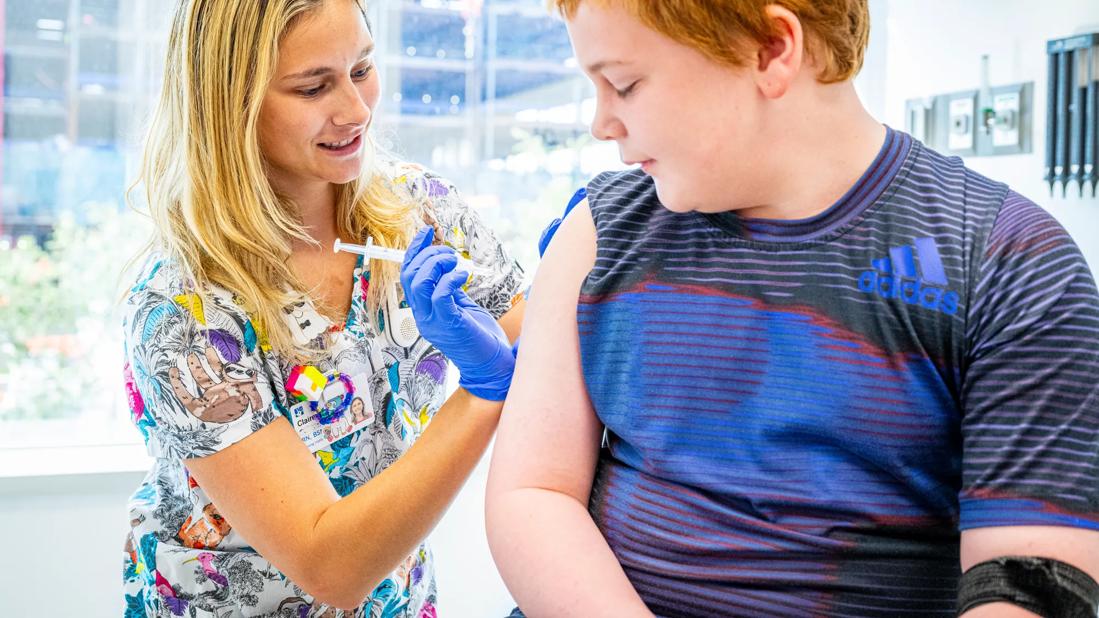Delivering specialized care and education that improves outcomes

Image content: This image is available to view online.
View image online (https://assets.clevelandclinic.org/transform/0f7fc4e4-b1a8-47a5-9f96-fd62b6e5b1f2/CHP_5223060_09-13-24_038_SCG)
Nurse giving shot
In today’s modern medical landscape, individuals and communities require varied, in-depth care that extends beyond the hospital. Ambulatory care settings — and the nurses who work in them — are vital to patients, providers and the healthcare system.
Advertisement
Cleveland Clinic is a non-profit academic medical center. Advertising on our site helps support our mission. We do not endorse non-Cleveland Clinic products or services. Policy
Nurses are often the first point of contact for those who receive ambulatory services. Through education, prevention and specialized care, they help manage chronic conditions, support the transition of care from inpatient to outpatient settings and improve clinical outcomes. Their work contributes to more efficient healthcare delivery, lower costs, reduced hospital admissions and increased patient satisfaction.
“Ambulatory nurses play a crucial role by providing accessible, high-quality care in outpatient settings,” says Lisa Sperry, MSN, RN, Assistant Nurse Manager, Cleveland Clinic Middleburg Heights Family Heath Center.
Sperry has been an ambulatory care nurse at the health center for seven years, although she’s worked there for almost two decades. She began her career as a medical assistant in primary care, which sparked her interest in nursing.
“I personally can't imagine doing anything else,” she says. “I’ve always loved ambulatory care and knew that once I became a nurse, I would continue my career in the outpatient environment.”
After earning her first nursing degree (she holds three), Sperry transitioned to a clinical nurse position within Cleveland Clinic’s primary care department and later served as nurse team lead. Now, as assistant nurse manager, she provides oversight for a wide variety of clinical specialties.
“The field of ambulatory nursing offers an abundance of professional growth opportunities,” she says. “It’s a great career choice because there’s so much versatility. Additionally, the flexible hours support an excellent work-life balance.”
Advertisement
Ambulatory nurses care for and support individuals, families and communities across all stages of life. They work in settings like primary care offices, specialty clinics and surgical centers, and see a variety of patients for everything from routine care and injuries to chronic or acute illness.
“Because the type of care we provide is so broad, ambulatory care is a great specialty for licensed nurses of any background,” Sperry explains. “It’s also ideal for those coming out of nursing school who don’t want to work odd hours or be in a stressful hospital environment.”
With multidisciplinary clinical knowledge, ambulatory nurses are well-versed in assessing and expediting appropriate care. They facilitate comprehensive practice and coordinate health services to establish and maintain nursing and clinical excellence.
“Sometimes there’s an assumption that ambulatory nursing leads to a loss of skills, but ambulatory nurses use their hands-on skills in many ways across a variety of clinical areas,” says Sperry. “We can also specialize in different outpatient settings, where we can apply evidence-based practice and critical thinking.”
In addition to in-person care, telehealth assessments are an important part of today’s ambulatory nursing job description.
“Unlike being at the bedside with eyes on a patient, phone assessments deeply rely on a caregiver’s ability to ask the right questions in order to understand the patient’s symptoms and disease processes,” Sperry explains. “In areas like primary care and pediatrics, written protocols also help guide the questions, care advice and patient disposition.”
Advertisement
The thing Sperry cherishes most about her professional life is that it allows for meaningful one-on-one interactions and relationship-building with patients and families. Because she’s spent her career at the same facility, Sperry has had the unique opportunity to care for multiple generations of families.
“I’ve cared for children who grew into adults, started their own families and then brought their children to the office to receive care,” she shares.
Having the distinct ability to work closely with the same team is another perk of the job — and one that consistently fosters a collaborative environment that ultimately improves patient outcomes.
“Collaboration and continuity of care are what initially attracted me to ambulatory nursing,” says Sperry. “I really value the opportunity to work closely with patients, their families and the care team to provide ongoing, quality care.”
Advertisement
Advertisement
Harnessing digital innovations to enhance nurse confidence and clinical outcomes
Regional organizations collaborate to address nurse faculty shortage
How wellness habits help nurses flourish
Planning continues with critical, patient-focused input from nursing teams
Strengthening care through targeted resources and frontline voices
Embracing generational differences to create strong nursing teams
CRNA careers offer challenge and reward
An unexpected health scare provides a potent reminder of what patients need most from their caregivers